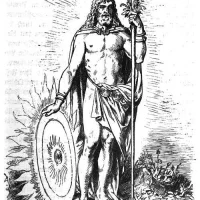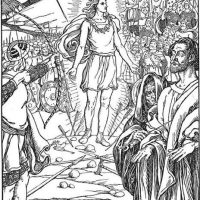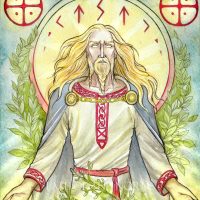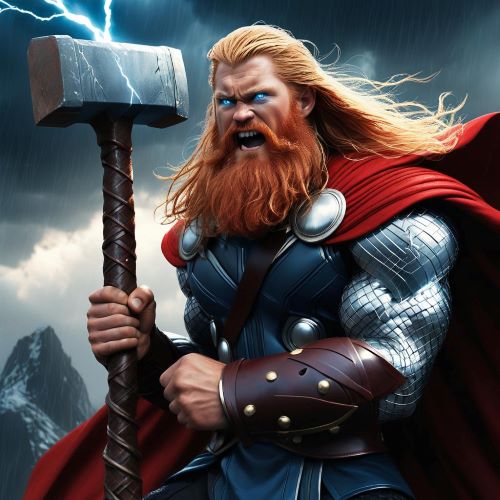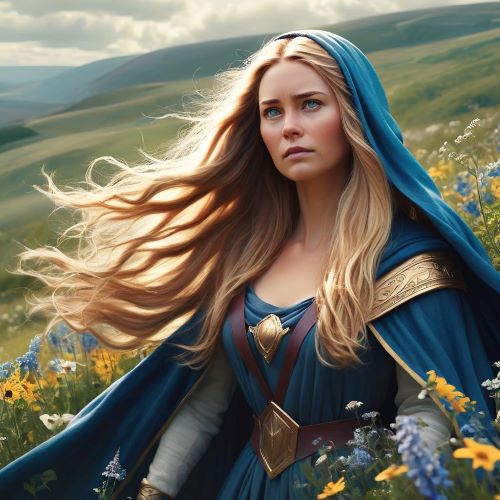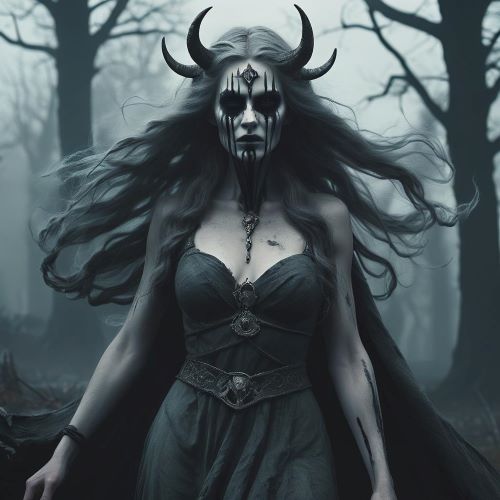Baldur : God of Light
Listen
At a glance
| Description | |
|---|---|
| Origin | Norse Mythology |
| Classification | Gods |
| Family Members | Odin (Father), Frigg (Mother), Thor (Brother), Hodr (Brother) |
| Region | Iceland, Norway, Denmark, Finland |
| Associated With | Light, Beauty, Peace, Love |
Baldur
Introduction
Baldur, known as Baldr or Balder, holds a significant role in Norse mythology, embodying love, peace, forgiveness, and light. Renowned for his unparalleled beauty and benevolence, he emerges as a central figure in the pantheon of Norse deities. Born to Odin, the Allfather, and Frigg, the queen of the Aesir gods, Baldur’s essence resonates with purity and radiance, captivating the hearts and minds of those who encounter his legend.
In contrast to the martial prowess of gods like Thor and Odin, Baldur’s character shines with a different brilliance. His name, translating to “bold” or “prince,” underscores his unique stature among the gods. Unlike the ferocity often associated with Norse deities, Baldur embodies qualities of beauty, light, and innocence, endearing him to both gods and mortals alike.
Physical Traits
Baldur’s appearance in Norse mythology is frequently described as strikingly handsome and radiant, embodying the essence of light and purity. His radiant presence is often likened to the illumination of light itself, with depictions highlighting his fair hair as a symbol of his connection to luminosity. Although surviving Norse texts provide scant detail about his physical attributes, Icelandic historian Snorri Sturluson portrays him as “the fairest and wisest of the gods,” implying an aura of exquisite beauty and wisdom.
Artistic representations from later periods further embellish Baldur’s appearance, presenting him as a youthful figure adorned with long, flowing locks and a gentle, compassionate countenance. Described as the epitome of celestial beauty, his hair gleams with the golden hues of sunlight, cascading like molten gold around features perpetually imbued with serene youthfulness. His eyes, akin to the clearest of skies, exude a profound sense of wisdom and empathy. Cloaked in garments of pristine white, Baldur moves with an ethereal grace that speaks of divine elegance, his very presence suffused with an unmistakable aura of celestial splendor.
Family
Baldur’s prominence in Norse mythology stems from his distinguished lineage within the divine hierarchy. Born to Odin, the revered Allfather, and Frigg, the goddess associated with love, marriage, and prophecy, Baldur occupies a central position among the Norse gods. His familial connections extend to his brothers Hodr, the god of winter and darkness, and Höder, his twin sibling, albeit less prominent in mythological narratives.
Married to Nanna, the goddess embodying joy and peace, Baldur’s union with her begets Forseti, the god revered for his role in justice and reconciliation. As a member of the Aesir tribe, one of the principal groups of Norse deities, Baldur’s parentage links him directly to Odin, the sovereign ruler of Asgard, and Frigg, the nurturing embodiment of motherhood and fertility.
The bond between Baldur and his mother Frigg is particularly significant in his mythological journey. Frigg’s unwavering love for her son is evident in her relentless efforts to shield him from harm. Her quest to safeguard Baldur culminates in her endeavor to extract oaths from all entities, both living and inanimate, pledging never to cause harm to him. However, Frigg’s oversight regarding mistletoe leads to unforeseen tragedy, unraveling the very fabric of Baldur’s existence and marking a pivotal moment in Norse mythology.
Other names
While Baldr stands as the most widely recognized name for this deity, various sources offer alternative titles to refer to him. Within the Poetic Edda, a compilation of Old Norse poems, Baldr is sometimes hailed as Baldr the Good or Baldr the Bright, accentuating his virtuous qualities. Moreover, Snorri Sturluson’s writings connect Baldr with the appellation Baldr Hvíting (Baldr the White), potentially underscoring his association with purity and luminosity.
Baldur’s identity transcends linguistic boundaries, resulting in diverse names across different cultures influenced by Norse mythology. Among these variations are Baldr, Balder, and Phol, each carrying nuanced interpretations while ultimately denoting the same divine figure celebrated for his essence of purity and illumination.
In various tongues and cultures, Baldur’s name undergoes alterations reflective of local linguistic conventions. In Old Norse, he is recognized as Baldur or Baldr, mirroring his association with brilliance and radiance. Old English renders him as Bealdor, while Old High German offers Baldag or Balder. Despite these linguistic divergences, the core essence of Baldur remains consistent—a figure revered for his unmatched beauty and inherent goodness, his name evoking imagery of purity and luminosity across cultural landscapes.
Powers and Abilities
Baldur’s mythos revolves around his unique attributes and his profound connection to light. Renowned for his invulnerability, bestowed upon him by the oaths extracted by his mother Frigg from all elements of nature, Baldur stands as an emblem of hope and protection in the Norse pantheon. His very presence exudes joy and illumination, dispelling darkness and despair, and enveloping the world in warmth and serenity.
As a deity, Baldur possesses a diverse array of supernatural abilities, each reflecting his character and essence. His near-invulnerability renders him impervious to physical and magical assaults, a quality that earned him adulation from both gods and mortals alike. Yet, it is his embodiment of brightness and radiance that truly sets him apart, infusing those around him with a sense of awe and tranquility. Furthermore, Baldur’s wisdom and peaceful disposition make him a sought-after arbiter and counselor in times of strife.
However, amidst his virtues lies a crucial vulnerability—the mistletoe. Frigg’s oversight regarding this seemingly innocuous plant would prove to be Baldur’s undoing. Exploiting this weakness, Loki, the cunning trickster god, orchestrated Baldur’s tragic demise. Disguised as an old woman, Loki manipulated Hodr, the blind god, into unwittingly hurling a dart of mistletoe at Baldur, piercing him and sealing his fate.
Baldur’s death cast a pall over Asgard, plunging the realm of the gods into mourning. Desperate to retrieve her son, Frigg beseeched Hel, the ruler of the underworld, for his release. Hel consented on the condition that all creation weep for Baldur. While most beings complied, a defiant giantess named Þökk, suspected to be Loki in disguise, withheld her tears, ensuring Baldur’s confinement until Ragnarok, the cataclysmic event prophesied to herald his return.
Modern Day Influence
Baldur’s presence resonates strongly in contemporary popular culture, manifesting across a diverse array of media platforms, including literature, cinema, and video games. One notable depiction of Baldur emerges in the renowned video game series “God of War,” where he assumes the role of a central antagonist, his story serving as a focal point of intrigue and conflict.
Beyond the realm of gaming, Baldur’s enduring legacy finds expression in literature and art, captivating the imaginations of audiences worldwide. In J.R.R. Tolkien’s epic saga “The Lord of the Rings,” the character Legolas embodies shades of Baldur’s grace and purity, illuminating the narrative with his luminous presence amidst the shadows of Middle-earth. Similarly, in Neil Gaiman’s contemporary fantasy novel “American Gods,” Baldur grapples with the challenges of adaptation in a modern world, confronting issues of faith and identity amidst shifting cultural landscapes.
Baldur’s influence extends into the realm of poetry and prose, inspiring authors and poets to explore themes of mortality, fate, and the complexities of perfection. Works such as Matthew Arnold’s evocative poem “Balder Dead” delve into the depths of Baldur’s tragedy, offering poignant reflections on the fragility of existence and the inevitability of destiny.
Moreover, modern Asatru and other Pagan movements that revere the Norse pantheon often incorporate Baldur into their spiritual practices. His association with light, purity, and peace aligns closely with the values cherished by these communities, offering a source of inspiration and guidance in their quest for spiritual fulfillment and enlightenment. Thus, Baldur’s timeless essence continues to leave an indelible mark on contemporary culture, serving as a beacon of hope and inspiration for generations to come.
Related Images
Frequently Asked Questions
What is lorem Ipsum?
I am text block. Click edit button to change this text. Lorem ipsum dolor sit amet, consectetur adipiscing elit. Ut elit tellus, luctus nec ullamcorper mattis, pulvinar dapibus leo.
What is lorem Ipsum?
I am text block. Click edit button to change this text. Lorem ipsum dolor sit amet, consectetur adipiscing elit. Ut elit tellus, luctus nec ullamcorper mattis, pulvinar dapibus leo.
What is lorem Ipsum?
I am text block. Click edit button to change this text. Lorem ipsum dolor sit amet, consectetur adipiscing elit. Ut elit tellus, luctus nec ullamcorper mattis, pulvinar dapibus leo.
What is lorem Ipsum?
I am text block. Click edit button to change this text. Lorem ipsum dolor sit amet, consectetur adipiscing elit. Ut elit tellus, luctus nec ullamcorper mattis, pulvinar dapibus leo.
What is lorem Ipsum?
I am text block. Click edit button to change this text. Lorem ipsum dolor sit amet, consectetur adipiscing elit. Ut elit tellus, luctus nec ullamcorper mattis, pulvinar dapibus leo.


